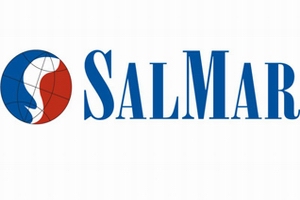 salmon producer SalMar reported operational EBIT of NOK 360 million (USD 58 million, EUR 43 million), up nearly NOK 250 million (USD 40 million, EUR 30 million) compared to the same time period last year.
salmon producer SalMar reported operational EBIT of NOK 360 million (USD 58 million, EUR 43 million), up nearly NOK 250 million (USD 40 million, EUR 30 million) compared to the same time period last year.The group credits the increase to higher salmon prices. However, biological challenges and the fact that 25 percent of the volume was sold under fixed-price contracts had a negative impact on the group’s results.
Gross operating revenues rose to almost NOK 1.7 billion (USD 274 million, EUR 204 million) in the period, up NOK 468 million (USD 76 million, EUR 56 million) from the third quarter 2012.
SalMar harvested around 34,800 metric tons (MT) of fish during the period, down slightly from 35,400 MT in the third quarter of 2012, which resulted in an operational EBIT of NOK 10.36 (USD 1.67, EUR 1.24) per kg.
Operational developments within the fish farming segment varied during the period. The biological situation in SalMar Northern Norway is good, while activities in SalMar Central Norway and Rauma have been affected by PD-related challenges. Productivity within the Sales and Processing segment was high during the quarter, despite a higher proportion of PD-fish being harvested. However, the segment's results were negatively affected by the Group's fixed-price contracts.
The latest biomass prognosis gives expectations of limited growth in the global release of smolt. Combined with certain biological challenges in the industry, this indicates continued low growth in supply in 2014. SalMar expects the market to remain relatively tight with good salmon prices in the time ahead. A portion of the previously forecasted harvesting volume for 2013 is being deferred to 2014 in anticipation of higher salmon prices.
In Norway, SalMar expects to harvest 114,000 MT in 2013 and 133,000 MT in 2014. The figures for 2014 include SalMar's expected share of recently acquired Villa Organic's volume in Finmark. Norskott Havbruk (Scottish Seafarms) expects a stable volume of 26,000 MT in both 2013 and 2014.
“We are very pleased to have achieved a solid improvement in our results. The group's results are satisfying so far in 2013 and SalMar is in route to deliver its best year in the company's history,” said Yngve Myhre, CEO. “At the same time we readily acknowledge that the results are largely attributable to a strong market. During the third quarter we have experienced biological challenges associated with PD in Central Norway, while our handling of salmon lice has been more extensive in certain regions. We take these challenges seriously, and are following them up closely to optimize our operations.”





